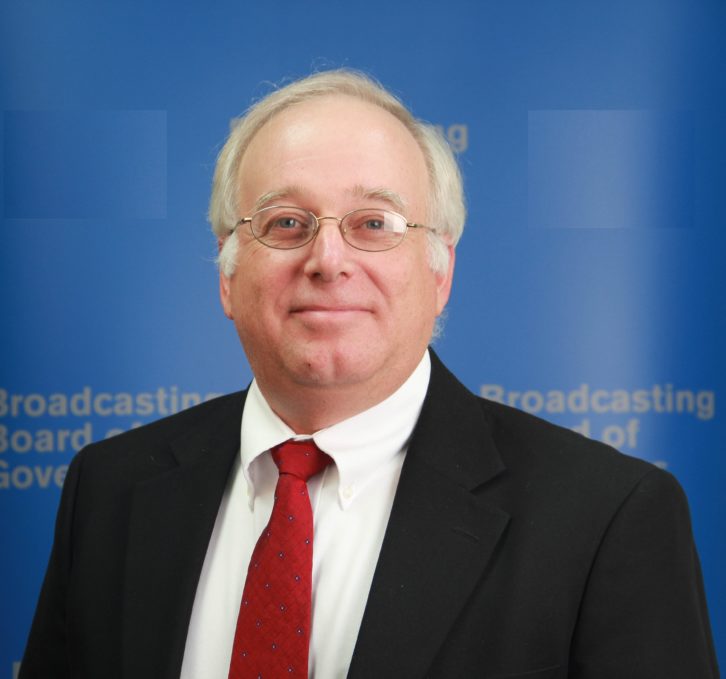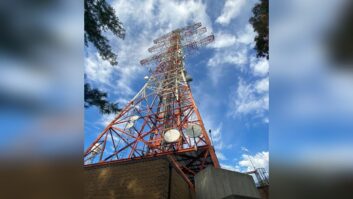Does it make sense to resume shortwave (SW) radio broadcasts to Russia and Ukraine, decades after international SW broadcasters cut back their services and people turned to the internet for information? Or does Russia’s blocking of online western news sources for its citizens, plus the millions of Ukrainian refugees lacking such access as they flee the war zone and millions more living in place without power and internet, make SW radio a viable option?
The first position was recently argued in our recent guest commentary, “Why Reviving Shortwave is a Non-Starter”, which was written by SW broadcast veterans Keith Perron and Daniel Robinson. The second case was advanced in rebuttal by RW readers in a succeeding posting, “‘Why Reviving Shortwave is a Non-Starter’ Sure Got Our Readers Started!”.
It is worth noting that both sides of this debate advocate providing Russia and Ukraine with better access to Western news and views. What’s at issue is the best way to do it.
Anyway, more detailed commentaries arguing for and against SW broadcasts to Russia and Ukraine have since been received by Radio World.
The Commenters

Arguing for SW broadcasts to Eastern Europe are Gerhard Straub and Kate Neiswender.
Before becoming managing member of The Chalaco Group, LLC, Straub was director of the Broadcast Technologies Division in the Office of Technology, Services and Innovation at the United States Agency for Global Media (USAGM). It is the US government agency that owns and operates the Voice of America, Radio Free Europe/Radio Liberty, and Radio Marti, among others.
Neiswender is the “point person” for Shortwaves for Freedom, a volunteer-led, crowdfunded group that is using shortwave to transmit English and Russian language Voice of America news into Eastern Europe and Russia. “People need the information that is being transmitted, and shortwave is one way to get there,” she said. (Note: Her organization is a pro bono Chalico Group client.)
Meanwhile, Paul Thurst stands with Perron and Robinson in seeing SW as a ‘non-starter’ in Eastern Europe. Thurst is Principal/Owner at Data Wave, LLC, a technical services provider in New York State’s Hudson Valley.
“Since I am still in contact with persons currently in Russia, I figured I would attempt to reach out and ask them what they thought about it (without putting them at risk, of course),” Thurst writes. “The short answer; the opinion by Daniel Robinson and Keith Perron is correct. Shortwave is a non-starter in Russia.”
[Read More Guest Commentaries Here]

Wrong from the Get-Go?
Straub and Neiswender mince no words in their objections to Perron and Robinson’s commentary. “The title and focus of the recent opinion piece, ‘Why Reviving Shortwave is a Non-Starter’ is confusing, because it is hard to revive something that is not dead,” Straub declares. “In fact, USAGM is in the middle of a multi-million dollar expansion of shortwave capability at one of its facilities at this very moment. In the past decade, no USG shortwave stations have been shut down, except for one that was beyond economical repair due to severe storm damage.”
This very point was made in a recent email from Larry Cohen (ham callsign WA2TVN ). “To say that shortwave radio is dead, is the equivalent of the 1960’s rumor that Beatle Paul McCartney was dead because he was barefoot in the Abbey Road photo shoot,” Cohen writes. “Even in 2022 Paul McCartney is quite alive and well…as is short wave radio. Shortwave radio sales are just as strong as ever…and often, the better models are sold out.”
As for the success of Shortwaves for Freedom’s SW broadcasts to Russia and Ukraine? “We are getting good feedback from the target zone,” writes Neiswender “Unfortunately, there are no rating services for shortwave radio. No one knows the exact number of shortwave listeners in Russia and Ukraine. But we know from the responses we receive that we are reaching people.”

To prove her point, Neiswender sent the following listener feedback to Radio World:
“Thank you, from Kharkiv, Ukraine.” (Anatol D.).
“I want to thank you so much for supporting Ukraine and for supporting freedom of speech in Russia under the Putin dictatorship! I know about the Shortwaves for Freedom initiative. Your project is very important. This crazy war must be stopped immediately!” (Dmitry E., Saratov, Russia).
“Those are actual comments we have received from listeners in Ukraine and Russia,” Neiswender. “And that’s why we think that what we are doing, with the help of hundreds of donors, is worthwhile.”
This author emailed Neiswender to ask how many responses their broadcasts – which are transmitted using WRMI Radio Miami’s SW facilities in Okeechobee, Florida – have been receiving from Russia and Ukraine. “Radio Miami says ‘dozens’ but [it] says [that] replies often go to VOA or Radio Free Europe, rather than the transmission company,” she said. “Plus there are other transmitters we are using. So I can’t give you an exact number.”
Note: Paul Jamet from the French shortwave listeners’ group Radio Club du Perche has sent RW links from Radio Taiwan International and Radio Romania International, both describing listener feedback to their broadcasts to Ukraine.
Who’s Listening in Eastern Europe?
Based on the questions Paul Thurst sent to his Russian contacts, AM, FM and TV are popular in that country, but shortwave and longwave radio broadcasts are not. “Amateur radio operators and some hobbyists may own these radios, but not the general population,” he was told. As for Russians having access to old SW radio from Soviet/Cold War days? “Not likely, and if there are, they probably don’t work,” Thurst writes. “Soviet equipment was not high quality.”
The common belief that people can access Western content using Virtual Private Networks (VPNs) over the Russian internet may also be overly optimistic. “Mostly young people will do this, but it is getting harder to find VPN apps,” writes Thurst, based on his Russian contacts’ feedback. “They are getting removed from online sources and people are afraid to install them on their mobile devices in case they have interactions with the police. Approximately 10% might be using a VPN.”
Now the Big Question: Will an information-starved Russian populace do whatever it takes to access Western news? If Thurst’s research is any indicator – and we should note that it is based on comments from his own contacts, not a large ratings-style survey – then the answer is no.
“Unlike during Soviet times, no one really cares about western news or opinion,” Thurst explains. “Things changed in 2014 with the first set of western sanctions (after the annexation of Crimea). The cultural ministry (Roskomnadzor) began blocking access to internet sites they deemed detrimental. There were few independent media voices left. With the 2016 US election and anti-Russia investigations, most Russians believe that the west is turned against them. The news, as presented on Russia-1 [the state-run TV broadcaster] is believed as truth.”
This being said, Ukraine is not Russia. People in that embattled country are motivated to hear what the West has to say, not least because this content can signal how far the West will (and will not) go in helping them resist the Russian onslaught.
“What rational argument can be made for not using every available asset in the information war, just as all available assets are being used in the physical war?” writes Straub. “Not everyone is adept at using VPN or Tor [the Dark Web browser] to circumvent internet censorship. However, most people do know how to tune a radio.”
“Even if one is equipped to use a VPN, how does that work when the city has been bombed and there is no power,” he adds. “That ‘old’ battery operated transistor radio still works.”
[Related: “An Argument for Shortwave Radio, Its Benefits in Times of Crisis”]
Last Thoughts
Well-reasoned and passionately-supported positions exist on both sides of this debate. There just isn’t room to post all of it here.
This being said, I would like to finish this latest update with what seems to be the most compelling point (to me at least) from both sides.
For Straub and Neiswender, the fact that SW may not be reaching a large number of Russian and Ukrainian listeners is not relevant. What matters is that it is reaching some of these people, especially in Russia where all other forms of mass media are being censored by Putin.
“Dr. Kim Andrew Elliott, former audience research officer at the Voice of America, has long noted that shortwave listeners tend to be opinion leaders,” Neiswender says. “Gorbachev was an assiduous listener. So if you can convince these people, they will spread the word among their contacts.”
“As a radio professional, I believe in the medium including HF broadcasting,” Thurst counters. “The point of my Russian friends: Even if (Western news) programs were directly receivable via radio (of any type), most Russian people would ignore them. It is not a technical matter of getting programming to them. It is more a perception problem, brought on by years of propaganda and negative press from the West. Such is the state of the world.”
Of course, people’s perceptions can change. If the war on Ukraine becomes an indefinite conflict like the Soviet invasion of Afghanistan (or the US in Vietnam), growing public pressure over mounting Russian casualties could someday force Putin and his acolytes to declare victory and withdraw. After all, the US used Afghanistan as a proxy war against the Soviet Union, by arming Afghan fighters with Western weapons until the Soviets quit. The same model could play out in Ukraine.
In the lead-up to such an event, an increasingly skeptical Russian public might once again look outside their borders for news they can trust, as many did during the Cold War.
This is why SW broadcasts to this region do make sense, as part of a multimedia approach to Putin’s propaganda. And this is why all sides of this debate are right, in the sense that Western news needs to get through the New Iron Curtain. Frankly, using every option available — not just SW and VPNs, but AM, FM, and even over-the-air TV – would be the most logical way to achieve this goal. Unfortunately, there’s just not enough money available right now to do it all.
Authors of the original commentary Perron and Robinson subsequently wrote a followup in response to many of the comments received by Radio World; read that here.
Radio World invites industry-oriented commentaries and responses. Send to Radio World.
James Careless is an award-winning freelance journalist with experience in radio/TV broadcasting as well as A/V equipment, system design and integration. He has written for Radio World, TV Tech, Systems Contractor News and AV Technology among others. Broadcast credits include CBC Radio, NPR and NBC News. He co-produces/co-hosts the “CDR Radio podcast” and is a two-time winner of the PBI Media Award for Excellence.







